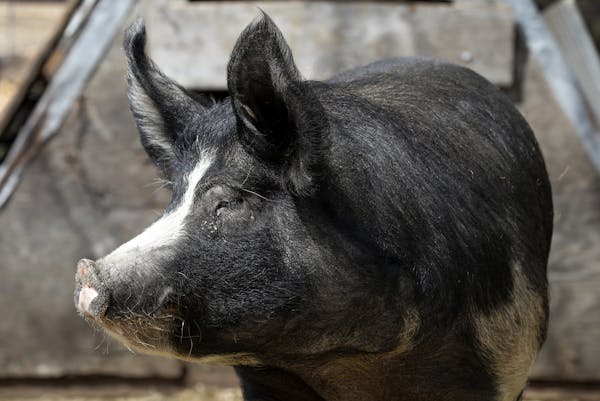ROUND LAKE, Minn. – The site where euthanized hogs are ground into compost in Nobles County is a wide open field across the road from a lakeside vineyard, guarded by two men in a white pickup.
From the road on Thursday there was no smell, and only light activity visible where excavation equipment and pickups sit beneath large brown piles of compost made from pigs and mulch.
Scott Ellenbecker, the owner of the Round Lake Vineyards and Winery across the road, said a lot of people have asked him what it's like to run a vineyard across the road from a field with huge piles of pig remains on it.
"There's been a lot of trucks going in and out of there, but otherwise it's not been a problem," Ellenbecker said. "Right now the only thing hurting business is COVID."
Tens of thousands of pigs have been euthanized in Minnesota in recent weeks — and likely hundreds of thousands more in other states — thanks to the shutdowns of meatpacking plants after outbreaks of coronavirus among workers.
One of those is the JBS plant in Worthington, a few miles from Round Lake, which was shuttered for almost two weeks and is only now gradually resuming production.
Last week, the U.S. Department of Agriculture estimated daily hog slaughter was down 40% nationally compared to a year ago. In a tightly calibrated pork industry, with roughly 500,000 animals meeting their end each day and piglets filling barns behind them, a shortage of slaughterhouse capacity has meant animals have to be euthanized.
For a few days, the plant in Worthington was operating only to euthanize hogs for farmers.
Greg Suskovic, a veterinarian and program director with the Minnesota Board of Animal Health, said the site in Round Lake started operating on May 2 and can handle 2,000 hogs a day. The dead pigs are fed into an industrial wood-chipper with an equal amount of wood chips or straw.
The resultant mixture is piled like a windrow, capped with wood chips and later turned by heavy equipment once it goes through a composting heat cycle. After two cycles, the compost will be ready for use on fields. The windrows at Round Lake rise higher than the trucks and backhoes nearby.
"We have a lot of experience with composting because this is what we did during the avian outbreak in 2015, when we composted turkeys and chickens," Suskovic said.
The state has opened a second site for euthanized hogs in Le Sueur County, and is trying to open one, maybe two, others, Suskovic said, though demand for this type of disposal has been lighter than the Board of Animal Health expected. About 7,500 hogs have been disposed of at the site near Round Lake, he said.
"A lot of producers are using rendering right now, and are also doing some of their own composting I believe, and they might be also using some landfills," Suskovic said. "We have no idea on any of that because, since this isn't a disease response, they aren't required to let us know what they're depopulating or how they're disposing of them other than that they're doing it by legal means."
The state has about 20 acres to work with in Round Lake and is paying the landowner, Keith Tordsen, a "set rate" for use of his property. Tordsen declined to discuss the site with a reporter.
Ellenbecker, the vineyard owner, said Tordsen is a good neighbor and a private man.
The state approached Tordsen multiple times before he agreed to let his property be used to dispose of the hogs, Ellenbecker said.
Barbara Hansen, who lives next to the vineyard, said she hasn't noticed a smell from the site, but like most everyone she finds the destruction of the pigs sad.
"I wish it had never gotten to this point. They should have been more on top of it, all the decisionmakers," Hansen said. "You don't bury food."

Want to share info with the Star Tribune? How to do it securely

'Safe recovery sites' would offer syringes, naloxone and more to people using drugs. The plan could be in peril.
New Minnesota GOP leaders seek peace with party's anti-establishment wing

Who is Republican Lisa Demuth, Minnesota's first House speaker of color?

